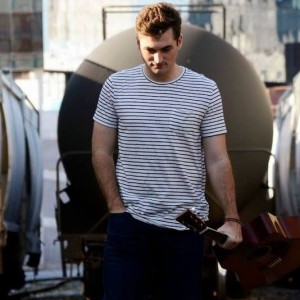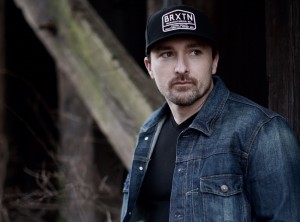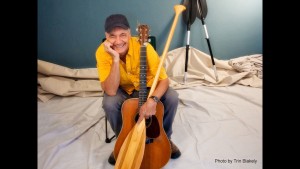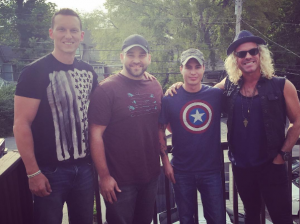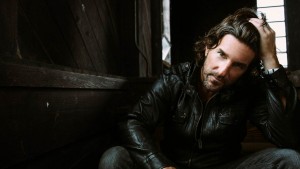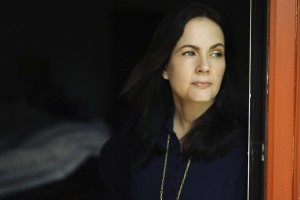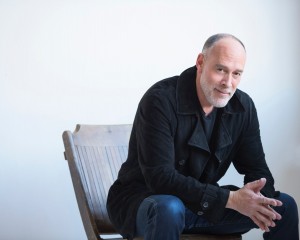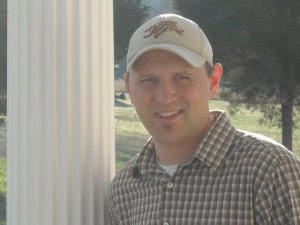
Songwriting Session is a column that goes behind-the-scenes with artists and songwriters. Each Sunday, a new songwriter will share their journey and provide lessons they’ve learned along the way. This week, Paul Compton shares what he has learned from working with Nashville songwriters as a song plugger.
Paul Compton was drawn to music from an early age. He played in his first band shortly after high school and eventually received a performance scholarship at Calhoun Community College in Alabama. In 1990, he moved to Nashville and completed his degree in Recording Industry Management at Middle Tennessee State University.
A fan of music and songwriting, Compton found himself interning at a publishing company called Murrah Music Corporation for two semesters. It just so happened that once his second semester ended, his boss exited which left a position open at the company. So, prompted by another employee, he applied and got the job. Compton would find himself at the same company for the next 17 years where he helped the early careers of many up-and-coming singer/songwriters including superstar in the making, Luke Bryan.
Compton recalls meeting Bryan around 2002 and while he says he never predicted the remarkable success that the “Move” singer would eventually have, he knew Bryan had the drive and determination to make it in the industry having come from a family of hard workers.
“When he walked in a room, before anybody even know who Luke Bryan was going to be, he could captivate a room,” Compton recalls. “This big southern voice, good looking guy, looks like a young Elvis, walks in a room and just lights up the party. You knew that if he could capture that in some artistic way on the stage with his songs, that people were going to respond because they did that before they even knew he could sing.”
Compton says Bryan was like a sponge when it came to learning about songwriting. He often borrowed what he could from people who had years of experience on him and soon went from someone they signed as an artist who wrote a little bit to becoming a “really respectable writer.”
Bryan’s early cuts included the title track off Travis Tritt’s 2004 album, Honky Tonk History and Billy Currington’s No. 1 song “Good Directions.”
“Luke started getting attention as a writer before his artistry was brought to fruition. He came at ideas from a different angle, wrote with writers who taught him how to craft a song. He was a good student and he worked hard. That was the deal with Luke,” Compton adds.
Compton says his job started out as a professional manager, what a lot of people in the industry call a song plugger. In addition to pitching songs to artists, he acted as a manager by setting up co-writes as well as demo production. He learned a lot from the publisher’s owner Roger Murrah, who is a Hall of Fame songwriter, and recalls Murrah having the perfect career attributes of being both creative and business savvy, which he says is often rare to find.
“I worked with him for 17 years, mentoring off of him, and slowly was promoted inside the company all the way up to Senior Vice President, which is the position I held for the last ten years that I worked there. We helped mentor young, aspiring professional writers to get to their first level and second level of success. Some of those writers, a great majority of them, went on to have No. 1 songs. I was a part of helping a lot of those writers get established, and get their songs cut. ”
For 17 years the company grew and was recognized by Billboard as Independent Publisher of the Year. Some of Compton’s personal successes included pitching what would become career songs for Kenny Chesney and Rascal Flatts. While he says there isn’t a direct science to getting a song in the hands of a popular artist, Compton would always pitch songs he believed in.
“I’ve been blessed to be around a lot of great firsts. Great songs that were a big part of not only the writer’s career but may have been a big part of the artist’s career,” he says with a smile. “I remember a young Kenny Chesney coming in, who had just gotten signed to RCA and they had cut most of his record, and they were looking for a few more songs. He was really desperate to find an uptempo song. I was back and forth playing him song after song of these uptempo songs, and towards the end of the meeting I kept asking, ‘Are you sure you don’t want to hear a ballad?’ He kept shooting me down, ‘No, I need uptempo.'”
Eventually Barry Beckett, Chesney’s producer at the time, urged him to try a ballad. So, Compton played him “When I Close My Eyes” written by Nettie Musick and Mark Alan Springer.
“He literally jumped off the couch, ran around the room, and it was almost like he had just scored a touchdown, he was so excited,” Compton recalls.
The song would be featured on Chesney’s 1996 album Me And You and make it all the way to No. 1 on the R&R chart (Radio and Records). It would also be his first No. 1 hit as an artist. Compton would have similar success with a brand new trio in 1999 — Rascal Flatts. Once again he was told by the band’s producer, Mark Bright, that ballads just weren’t probable at country radio. He recalls him saying, “A ballad right now is impossible. A midtempo is next to impossible. We just need uptempo songs to finish the record.”
Compton had only brought a midtempo and a ballad with him to the meeting, where 10 other song pluggers went around in a circle and pitched their songs. So, he started with the midtempo. He was the last one at the table and was getting increasingly more nervous as his turn came to play the ballad.
“I’m sitting there the whole time sweating bullets and thinking, ‘I’m holding a ballad and that’s all I’ve got.’ It’s like playing poker when you know you have nothing, and you’ve got all the chips on the table,” he reasons. “I believe in this song, I know it’s a hit song, I know it’s great. It kills me. It’s brand new, maybe I’m just too in love with it. I start trying to talk myself out of it. It gets all the way back around to me and I had no choice. I’m like, ‘Here’s the moment of truth. Either they’re going to laugh me out of the room, kick me out of the room, or think I’m a complete idiot, but I’m totally committed to this song, I believed in the song.'”
So, he plays the song and the room remains silent as the track comes to a close.
“It’s like that awkward thing where you tell a joke and nobody laughs right away. It’s like, ‘Oh my gosh!’ Then it’s almost like everybody exhaled, and Mark Bright said, ‘They can like it now or they can like it later, but we’re cutting this song.'”
That song — “I’m Movin’ On” written by Phillip White and D. Vincent Williams — would become the last single released off the band’s self-titled debut album in 2000 and garner them an ACM Song of the Year win.
“It was a good moment for them and a great moment for us,” Compton adds. “I love songs that go past the entertainment value, that actually change people’s lives. I remember seeing emails and reading stories about how there were people contemplating suicide, going through a drug addiction, who were in prison. There were people going through the lowest point in their life and they heard that song, and it gave them hope that they could move on. When you’re a small part of something like that and you put it out into this world that went way past just entertainment, that’s a pretty special feeling. I hope Nashville can continue to celebrate those kind of talents and that kind of creativity that can foster those kind of songs.”
Murrah Music was bought out in 2009 and the company has since dissolved. Compton, however, has far from stopped helping up-and-coming songwriters. He has started a management company called Music Highway Writers Services that is strictly focused on writers. While he works on a daily basis with artists and singer/songwriters, he prides himself in helping the unsigned writer who hasn’t gotten their break yet. His goal is to help each writer get to the next level. Additionally, he helps the older, more established writers stay connected and plugged into the Nashville songwriting scene and acts as a consultant for those hoping to build their own publishing companies. Compton aims to help Nashville newcomers to navigate the waters easily and with nearly 30 years in the business, he is offering his talents to many Music City transplants.
“There’s a saying I used to have in my office, ‘You become successful by helping others become successful.’ That has been the motto of my career. I’m only successful if my writers and my artists that I work with can find success, and I’m happy with them getting all of the spotlight, because that’s not what I came to town to do. When they have their moment, there’s no better feeling in the world than to watch them revel in their moment.”
